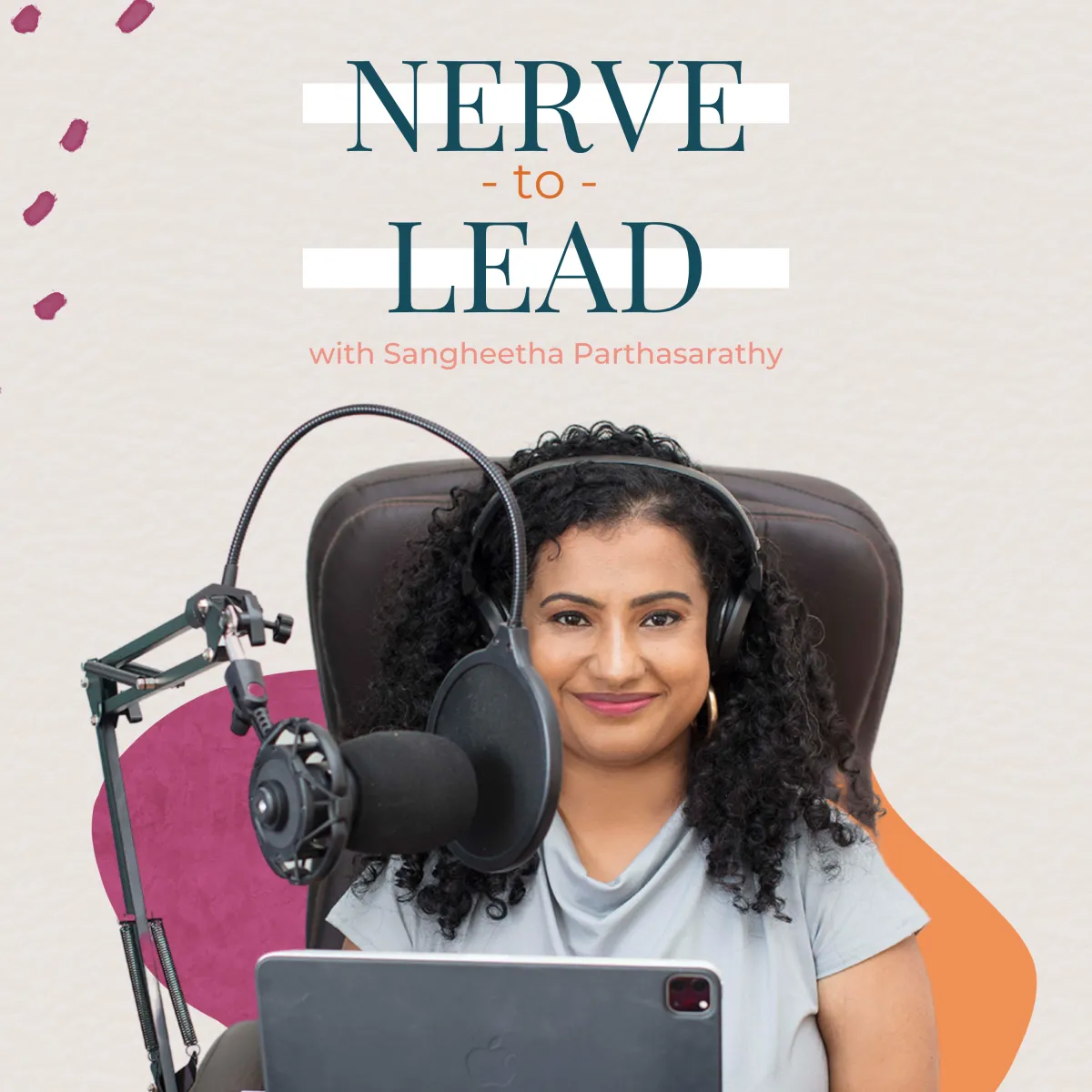The Nerve To Lead Podcast
with Sangheetha Parthasarathy
On The Nerve to Lead podcast, your host, Sangheetha Parthasarathy encourages CEOs, Entrepreneurs, deep thinkers, the round-pegs-in-square-holes, change-makers and visionaries to share their stories of power, pleasure and passion.
We cover everything from nervous system regulation, high achievement, trauma healing, parenting, partnership and attachment, intimacy and more. You will also get to learn the stories and knowledge from our expert guests and thought leaders.

Apply to be a guest on
Nerve to Lead Podcast
Welcome to 'Nerve to Lead' podcast. Apply here to be a guest on the podcast with Sangheetha Parthasarathy.
Invite Sangheetha as a
guest to your podcast
Invite Sangheetha, a Nervous System Coach, Speaker and Consultant to be a guest on your podcast.

High Achieving First Gen Immigrant Leadership & Parenting - Part 1 of 2
EPISODE TRANSCRIPTS
INTRODUCTION
Welcome to the Nerve to Lead podcast. Here we explore power, pleasure, leadership, identity, belonging, parenting, and couplehood, and explore stories of navigating through life, finding both authenticity and attachment through the common lens of the nervous system. I am your host Sangheetha Parthasarathy and I'm so glad you're here.
INTRODUCING SUVARNA KRISHNAN
Today, I'm joined by Suvarna Krishnan. Welcome. So Suvarna, would you like to introduce yourself a little bit for our audience?
Sure. I'm Suvarna Krishnan, and I live in Boston Massachusetts, a long way from home. And I work at a big company, a tech company, and I'm a director of software engineering at this tech company. I have a six year old son. He is a whole bundle of joy and I love playing around and having fun with him. And I also am a graduate from the infamous/ famous Bits Pilani, as you know, as is Sangheetha. Yeah, so that's a little bit about me in a nutshell, Thank you.
I think I met Suvarna when she was 18, I wanna say. Yeah, Maybe 17 probably And we've known each other since, and it's just so beautiful. You look back and think, oh my God, I've known you for so long. Yeah, True.
Yeah.
So, we've known each other for a long time, and then we've also worked together in a client provider capacity.
THE RIGHT KIND OF NON-WHITE IN TECH LEADERSHIP
So I'll start off with this, race, gender, and being the right, right kind of non-white in technology. So, talk to us about being in a leadership position in a tech company, but being the right kind of non-white and what that's like. It's a very interesting, bunch of adjectives, I wanna say.
I mean, and I get that, it may sound like a funny question, but it has a lot of deep meaning there, and, and there is, I really appreciate you like talking about it. So I moved here to Boston about 15 years ago. And I have always been in tech. I've always worked in computer programming and I've kind of climbed the ladder in tech. I used to wonder, like, I mean, whichever company I worked for originally, it was a minority run company, so I was always surrounded by minority. However, it was considered that the kind of people that worked with me are a model minority, right? Because most of them were brown and Indian or Asian. So having surrounded by this group of people, it used to make me wonder like everything they did was, a certain way, right? And what I felt was there is this whole need to conform to this model minority myth. Over the period of years, I've realized that anybody who is brown or Asian has a certain way they do things, right? And there is reason behind it, and there is this also the subconscious pressure to conform to that and I'm considered a millennial, but I'm mostly a Gen X, but our generation is like intentionally not doing it, but then subconsciously they have this need to conform to it because of the fear, because we are immigrants, right? And there is a fear of not being able to move ahead in your career or if you don't conform, right? There is that fear.
BREAKING THE MODEL MINORITY MYTH IN TECH
And for all we know, this whole concept of model minority is a myth. And it is proven that it's a myth, and there is research out there that it's just a way people kind of back then, pushed this high achievement into minorities and made that the big deal, right? So, I feel like that is what has propelled me, you know, as a brown woman in a new country, I had to stick to the script agenda, right? The script. And I had to do what I supposed to do, and for me to get wherever I was supposed to get. And I had that, that was my only thing that I concentrated on. I worked my ass off. I improved my skills I kept fighting imposter syndrome. And all of this is a result of wanting to conform to that model minority myth, right? Mm-hmm. And it is not just my struggle. As you may know, there are a lot of women like me who do struggle with this issue, who are minorities, right? Who are brown or Asian or any other minority and tech is such a field where your skillset and all of your work is looked at with a fine tooth comb, and you are being assessed year after year, your capabilities are being assessed, and every year you need to outperform yourself really, if you think about it. And that is the precedence our previous generation has set for us, right, as immigrants. And that is what is expected of us. And that itself is a lot of pressure for anybody our age, even if they are men or women, it doesn't matter what gender they are, this is the amount of stress and pressure that they'll have to face to be able to conform to that script and to be able to achieve the success that is set for them. And success is, that is success for us, right?
REDEFINING SUCCESS IN TECH: A MINORITY PERSPECTIVE
Success is not having a happy day. Success is not enjoying, being a mom. Success is not enjoying being a dad. Success is getting a promotion. Success is being able to outperform yourself or get an award or be employee of the month or employee of the year. But again, I think that pressure is uniquely high for people like us who are immigrants for various reasons, right? Like, there is pressure from outside, there's pressure that they'll have to face within the family. Again, Asian upbringing, and then moving to a new country, making sure that you are the right kind of non-white, like you said, yeah. So, you know, all of that. And I think it's still happening and it's still the case, that you have to be that. It shouldn't be right? It shouldn't be the norm. It shouldn't be how it is. Success should be about doing what you enjoy. Success should be about, wanting to do something that you really enjoy doing. And it shouldn't be something like, okay, to be successful, you do A, B, C right? Everybody's success is unique and it's about them, and it's about their lives. It cannot be a script that you have to follow. So, which is what I feel like is something that everybody needs to address and look at and at least think about.
THE PASSPORT IDENTITY, THE CULTURAL IDENTITY
Yeah. And I think it's very interesting, all of those aspects that you mentioned. The thing that you said about tech, I remember this, I can't remember what year it was, but that was the year that San Jose became a majority minority city, which is so weird when you think about the labels, right? What is majority minority? There are parts of tech in the US which are majority minority companies. I think of it like that, which means that not only are they run by first generation immigrants, the whole company and its employees et cetera, are majority minority, right? when you think about it. So then there is a cultural aspect to this, you know, belonging and identity and othering and all of that. And then there is a very real first generation immigrant survival related anxiety. I don't know Hasan Minhaj says it really well about the difference between his father and him, when you immigrate, and it doesn't matter when your passport changes or if it does at all. So we all first generation immigrants have a passport identity, and then we have a cultural identity, and then we have a gender identity, we have a political identity, and all of these get, you know, super imposed on each other. And we have all of these very faceted, you know, different dimensions, I think to that. But I think the first generation survival anxiety is very, very real. I think that is the thing that, yeah. the model minority and, conforming to the script and what success means.
SUCCESS AS SURVIVAL
I think success still is survival energy, right? Like, so there is, yes, there's promotions and all of that, but success is also down paying a house, buying that car. Yeah. Sending children to private education things. Extraordinary focus that because achievement, knowledge, academic success equals survival, you know? Yeah. And I think that is what makes the first generation immigrant journey extraordinary. It's a tale of survival, and the shadow to that is that when you have two nervous systems in a household, predominantly wired for survival, rather than thriving, and by survival, I don't mean we are refugee immigrants, right? Like it's not, yeah. But there is still a very real threat. We're in the middle of recession and layoffs, and it hits people that are visa dependent very, very differently because your right to stay in this country is not taken for granted. And again, I don't think it's about the passport as much as about the space that you're allowed to take, the privileges that you afforded, and the gratitude for the opportunity that's in front of you, and that hyper-focused survival, which means that over a period of time, there is dissociation from various racial and other issues, which is what makes you a model minority, because you're able to dissociate from issues of race and gender and just kinda plow on and be grateful for being given the opportunity to come into the country. It's the servitude, the colonial, British colonial servitude that we have, and that's so internalized in our bodies, white first notions, like trying to be white. What I mean, whether you're an immigrant in the states, or you're in India, we all have that very deeply internalized, with the colonial trauma in our bodies. And unfortunately, yes, that's what makes you the model minority, the going above and beyond and all of that. I think this is the dichotomy, right? I think these are all traits that, help Indians, immigrants, you know, first generation tech educated people that go to, not just survive, but really build, you know, thrive, root themselves and thrive in an economic sense. And then I wonder what it does to the nervous systems, parenting, intimacy, ability to slow down and savor the success, et cetera. I mean, we're so focused on as we do, right? to create stability, I suppose. And then there is that latent fear Yeah. That we live with throughout, that permeates into every aspect of our lives, I think, in career and all those different aspects.
DIVERSITY & INCLUSION THROUGH THE EYES OF A WOMAN OF COLOR IN A LEADERSHIP POSITION IN CORPORATE AMERICA.
I wanna shift gears a little bit and talk about diversity and inclusion in this context. Now, you are a woman of color in a leadership position, when you look at the approach to D & I, how do you see it? In general, if you ask me, Corporate America, there is a lot of opportunity for D & I and a few companies are, I wanna say, doing it, have initiated it, and they have the right intentions. However, America is a very homogeneous, comparatively homogeneous country. There is not much diversity in terms of population, right? Like, as opposed to India. Oh, yeah. You turn anywhere, you see diversity there. So we are attuned to kind of, that kind of diversity. I grew up in India, so I am always looking for diversity around me, but that's not the case here. There is a lot of assumptions and stereotypes about what a diverse population is, which I think is why there is opportunity in getting better. But maybe a year ago, the whole concept of D & I was like a buzzword, right? Like everybody was talking about it, and obviously there was AIs that were built that had bias in them, and that kind of triggered a whole conversation about diversity in hiring, and diversity in executive positions, and all of that. So, I think it's moved on from being just a buzzword, and it's become more of a core aspect for many companies because of the generational change, right? So there is 5 or 6 years ago, Trump became president, and that kind of triggered a few things, and it kind of emphasized more on the importance of inclusion and eventually diversity. And now there is also this generation of kids who are graduating and going into workplaces and they're expecting diversity. And it's because it helps, right? Diversity has been proven that when wherever there's diversity, the innovation is much, much higher, right? And I even have data around that research, and I've looked at it myself. And it is true. I mean, when you have a diverse workplace, you do have more innovation, and there is more chances of making sure that you're not biased. You're not building something, especially in the tech world, when you're doing AI research or machine learning, you wanna make sure there's no bias, right? And having a diverse group of engineers, or diverse group of people whom you work with is going to have an impact. And again, a lot of the laws have, you know, I mean, it has gone both ways, either ways in America, but, a lot of support for various LGBTQIA's and all of the other general minority groups has, it has gained some traction, right? Mm-hmm. In the past few years, especially because of the whole whatever happened with Trump's presidency and all of the things that happened and followed after that, and various Supreme Court judgments that have passed. Yes. Oh, yeah. So all of this political change has actually, in some ways, forced corporate America to start and look at D & I as an important criteria or an important aspect for their own companies. And that is a good thing. And, but then, as I said, America is a homogeneous country when compared to countries like the Indian subcontinent, or anywhere else. So there is a lot of work to do. And, it's only the beginning if you ask me, it's the tip of the iceberg, and there is still a lot of work to do, and there is a lot of opportunity, but then the trend is good. Like it's trending. Well, that's what I wanna say. And the younger generation is really passionate about it, which is amazing. And there is a lot of diversity that I see in corporate America among the younger population or the early career population, right? I mean, not really younger, but early career, I wanna say. When there is not enough diversity at positions that are decision making positions, bad decisions get made and bad precedences get set, right? Like what happens in the Supreme Court Yeah.
Stuff like that, right? Mm-hmm. So there needs to be that urge for D & I at higher levels and it's good that early career is good at a good level. In most companies it's the case, from what I know. But as you grow, I think women have their own issues and women have issues with career, and we'll talk about that a little bit, but I'm just saying being a woman and being in tech and having a career is not going to all work out all the time for all women. I mean, honestly speaking, right? It's, there's a lot of right place, right time, right partner, right family, right? There's so many other things that actually are playing a part in this particular thing. So that is one of the, one of the reasons, and again, there are other issues too, right? People's confidence levels and immigration trauma, as you said, there is, even other trauma, right? Like yeah. Minorities in general, right? Absolutely.
Um, Yeah. Yeah.
So all of that plays a part.
Yes. Yeah, absolutely.
D & I AS A PRACTICE THROUGH THE LENS OF A TRAUMA INFORMED NERVOUS SYSTEM COACH
I think I just wanna zoom out and talk about D & I, as just a practice, I feel like, and when I worked in the corporate world in America and in the UK, I've always been very interested in and been a part of diversity related panels, et cetera. However, obviously now I think the conversation has changed thankfully and evolved. I almost feel like that, you know, we have to start with the basics, you know, we can't talk about othering and belonging and inclusion, without talking about the systemic forces at play and what it does to people's nervous systems I think we're talking about diversity and dimensions, and I think there is, what's exciting for me is that it's opened up a large canvas in which we can layer some very basic fundamentals about othering and belonging at a very nervous system level as to, when you think about the nervous system and attachment, this as human beings, we're all biologically wired to connect. That's part of what makes us feel safe. And there is a social engagement part of our nervous system that is constantly building these connections about cues of safety. And we talk about psychological safety in the workplace, but again, that is also a very cognitive way to think about it. But belonging and safety and othering are actually very, very early nervous system imprints that will influence the way we show up for ourselves as well as others. And we can't be truly inclusive or diverse if human beings don't feel safe with each other at a nervous system level, like an autonomic nervous system to nervous system safety. And I think that's very exciting to be able to offer D&I through that perspective. Mm-hmm. You know, beyond and layer the cognitive stuff on top, but also be able to zoom out and look at othering and belonging as a bodily biological function. I think that's very exciting. And that's kind of one of, one of my goals for this year, is to be able to offer that to D & I initiatives and leaders, to add more dimensions to the work. Sure.
RESOURCES - DOWNLOAD THE FIRST GENERATION IMMIGRANT NERVOUS SYSTEM GUIDE
And now a small break to talk about more resources. We've created a guide called The Immigrant Nervous System, which walks you through first generation re-rootedness in all its various aspects. It is free for you to download and use. It is available as a link on the episode show notes. Now back to our conversation.
DO WE REALLY SHIFT GEARS POST-PASSPORTS? SURVIVAL-BASED IMMIGRANT PARENTING
So shifting back a little bit to the conversation we had earlier about nervous systems and high achievement, model minority and sticking to the script, what it means to be like that first generation immigrant and make it, I think one of the biggest, two things that I wanna talk about is the impact of that on career and success, which we've obviously discussed. I think it sets us up uniquely to grab hold of opportunities and grow and build success and personal wealth. Yeah. And have voices and build financial safety nets for ourselves and our children. And I think that spirit and that plowing on, has all of those positives I think in career and finance and personal wealth building. Talk to us about parenting, and then we become parents Yeah. And then that puts us in this real big paradox, of I have had to survive and I have had to find my place in the society and like be acknowledged or whatever, right? And now we have our passports, we have the houses, there is a survival need that has been fulfilled largely by that, the first generation. And then you have children who don't quite have that prerogative that you had, you know, roof over the head, the right to stay in the country, even if you didn't have a job. And how does that change or does it change, you know the lens or are we still parenting in a survival based capacity? Tell us about immigrant parenting.
It's definitely, we do have that basic survival based parenting happening, like in parts and it's a conscious effort to actually let it go. Right? I know what you're talking about when it comes to like this insecurities about your ability to stay in the country, or your visa and your job controlling everything about your life, right? I've been there and I'm glad I'm not there anymore. Obviously, that is something that was a big part of my life, at some point. Absolutely. Huge. Yeah. Yeah. It's a huge part of my life, and I used to be very concerned about it because my son is an American, and I used to have this fleeting thought that, what if something happens and I'm at this border and I'm talking to an immigration officer, and I'm trying to enter the country with a visa and for some reason I'm deported, but my son is there. I'm not really concerned about the deportation, I'm more concerned about what could happen because all the horror stories you listen to, right? And it's probably never going to happen, but it might, right? Because you're an immigrant and you're still not an American. So that, and there used to be discussions about
IDENTITY IS BELONGING, IDENTITY IS ATTACHMENT
It's happened even with my five year old, four year old child at the time. he used to ask me, why are you not an American? Why am I an American? And I used to have to explain it to him and it was not an easy conversation to have, but I had to have it, right? Mm-hmm. I mean, how do you explain this to a four-year-old? It's quite impossible if you ask me but whatever we can do, we can try to do and, and be honest, right? And identity is belonging, identity is attachment. And for the four year old, am I different from you, Exactly. Mm-hmm. And it's his parent that he's talking to, right? Yes. He's not talking to somebody else. It's he's talking to his own parent, and he's bringing in these ideas that, oh okay, I'm the only American in my family. Like, he still says that I'm the only American in my family because I don't have American passport, right? I still am an Indian, so we are very open about it in my house, and we talk about it, and, and he's aware of that, and I'm glad he is. But what kind of, you know, is this something that might traumatize him in the future? I don't know, right? Mm-hmm. Because he is not a first generation immigrant and he's an American child. Mm-hmm and I have no clue how this can be handled or what is the best way to handle it, but here we are, right?
DOING THE WORK AS A FIRST-GENERATION PARENT
And the other aspect to all of this is, as an immigrant, right, you're always, it's kind of like you're holding your breath and trying to succeed and, and be the best so that you can hold onto this position that you're in, right? Mm-hmm. Hypothetically, like the proverbial position you're in, in this country. Your space, your space, your space. Yeah. Yeah. And in this country, and you don't wanna let it go because letting it go means you have to do a lot of work to rebuild it elsewhere, right? That's right. That's right. And it's as if you are letting go of all this work you've done to build this, right? That's right. Build whatever it is that you have. So it becomes, it is kind of taking over everything in your life, right? Mm-hmm. thankfully we have done a lot of work, and I have lost that feeling that I used to have, but yes, it used to be overly, what to say, all encompassing, yes, it'll take over your energy, your day-to-day, what you do next, and yes. What kind of jobs you're looking for, or, yes. Everything, right? Yeah. Even today, every immigrant on a visa is going through this, right? And absolutely, it is not an easy thing to just forget or come out of unless you actually work on it, right? Mm-hmm. I'm glad I did work on it. I'm glad I pushed myself to do it, and I'm glad I'm here. And, I really wish everybody puts in that work and, and tries to get out of that feeling that is overpowering you every day. However, I think it is something that is inevitable as an immigrant, and it's something you need to acknowledge and, and know that it's going to be there, right? And yes, you get over it in time. Mm-hmm. Right? And yeah, so that I think is, as a mother, that was one of the biggest struggles for me. But, I've gotten over that.
CLOSING AND END CREDITS
And this concludes part one of my conversation with Suvarna. See you in the next episode. Thank you for joining me today on Nerve to Lead Podcast. The music you hear in this podcast was created by Sound Creed. You can find their link in the description. Thank you to Vaishnavi and Pavithra in team Sangparth for producing and editing this podcast. Did this episode resonate with you? If it did, please share it with your friends, family, coworkers, or clients. We would also love to hear from you. Drop us a note on www.sangparth.com.
What we offer
Our Areas Of Focus

Career, Entrepreneurship& Leadership

Sex, Relationships
& Parenthood

Eating, Movement &
Body Image

